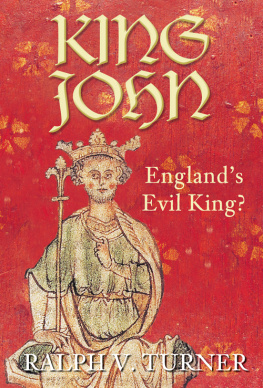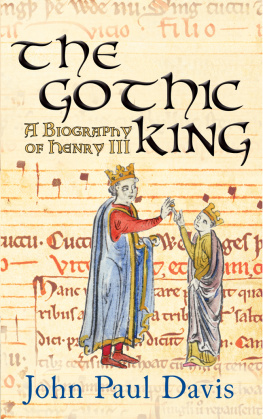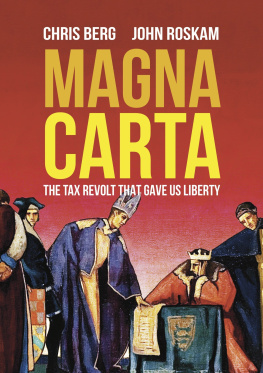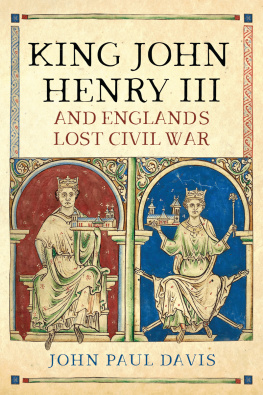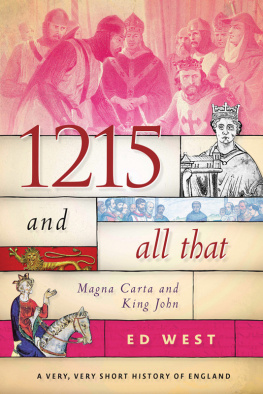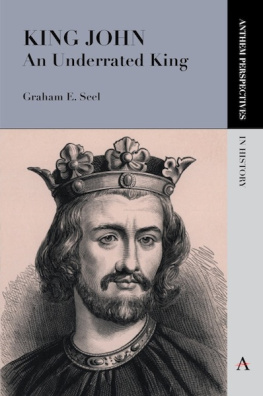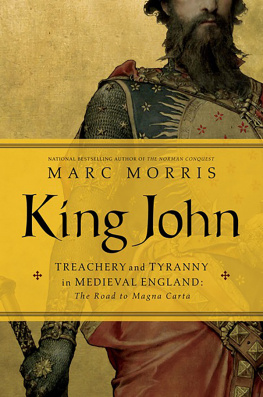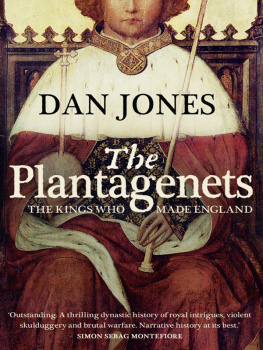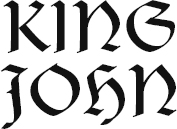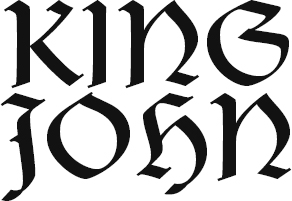Englands
Evil King?
RALPH V. TURNER
First published 1994
This edition published 2009
The History Press
The Mill, Brimscombe Port
Stroud, Gloucestershire, GL 52 QG
www.thehistorypress.co.uk
This ebook edition first published in 2011
All rights reserved
Ralph V. Turner, 1994, 2009, 2011
The right of Ralph V. Turner, to be identified as the Author of this work has been asserted in accordance with the Copyrights, Designs and Patents Act 1988.
This ebook is copyright material and must not be copied, reproduced, transferred, distributed, leased, licensed or publicly performed or used in any way except as specifically permitted in writing by the publishers, as allowed under the terms and conditions under which it was purchased or as strictly permitted by applicable copyright law. Any unauthorised distribution or use of this text may be a direct infringement of the authors and publishers rights, and those responsible may be liable in law accordingly.
EPUB ISBN 978 0 7524 6901 0
MOBI ISBN 978 0 7524 6902 7
Original typesetting by The History Press
Contents
Acknowledgements
W hen I began studying under Sidney Painter at the Johns Hopkins University over thirty years ago, it never occurred to me that one day I would write a biography of King John. My own work has made me more respectful of Painters Reign of King John, a masterful study of early thirteenth-century England published in 1949 that he plainly stated is not a biography but essentially a political and administrative history. My attempt to present a new portrait of King John also has made me mindful of Kate Norgates unequalled knowledge of the chronicles displayed in her 1902 biography, John Lackland, and of W.L. Warrens judicious balancing of narrative accounts and administrative sources in his 1961 biography. My book cannot replace these earlier studies, but builds upon them, taking advantage of more readily available sources and of recent scholarship that suggests new approaches to a deeper awareness of John and his reign.
This book relies not only on earlier works on King John, but on the scholarship, friendship and encouragement of many fellow historians on both sides of the Atlantic, notably David Bates, editor of Longmans Medieval World series, for his confidence in my work and for his perceptive comments. Special thanks go to John W. Baldwin, Professor Painters successor at Johns Hopkins, author of an important study of Johns contemporary, Philip Augustus, and a mentor who has consistently encouraged my scholarly efforts. He read an earlier version of a chapter of this book, as did C. Warren Hollister and Charles R. Young. Also I acknowledge my debt to Sir James Holt, not only for his writings on the Angevin period but also for his friendship. Many others have given generous assistance, among them RaGena de Aragon, Fred A. Gazel and Sue Ann Walker, who sent me copies of papers otherwise unattainable, and all members of the Charles Homer Haskins Society, who patiently listened to exploratory papers on King John at its Houston, Texas, annual conferences.
Several agencies assisted me with grants that made available research travel and time for writing. The Florida State Universitys Council on Faculty Research and its Committee on Sabbatical Grants, the National Endowment for the Humanities, the Henry E. Huntington Library, San Marino, California, and the American Philosophical Society, all supplied funds. The Department of History at Florida State afforded me the necessary extended stretches of time for writing. Many libraries besides the Strozier Library at Florida State made their resources available to me, among them the British Library, the Institute of Historical Research, University of London, and the libraries of Duke University, Emory University and the University of North Carolina.
Ralph V. Turner
Tallahassee
8 December 1992
ABOUT THE AUTHOR
Ralph V. Turner was until his retirement Professor of History at Florida State University in Tallahassee. His other books include Magna Carta. He lives in Tallahassee.
Introduction to the 2009 Edition
Fashions amongst historians change over the decades, and popular opinions of King John have continued to change over time as well. When BBC History Magazine polled historians in 2006 for the worst historical Britons in the last ten centuries, King John was selected as worst for the thirteenth century, alongside Jack the Ripper for the nineteenth and the Fascist Oswald Mosley for the twentieth. Historians attempts to give more balance to the traditional image of Bad King John, by depicting him as a premature practitioner of administrative kingship, have had little success. The only book treating King John since this one first appeared in 1994 is Frank McLynns popular work Richard and John: Kings at War (Da Capo Press: New York, 2007). It reconfirms the popular view that predates the nineteenth-century professionalisation of the study of history; as the books jacket states, Richard was everything youd hoped for, and his brother John was the toad youd always expected.
When turning to academic historians, one finds surprising little published on King John since the last decade of the twentieth century. Medievalists today often reject notions of the Middle Ages as the birthplace or childhood of modern European civilisation; instead, they stress its otherness, an epoch alien to modern scientific and secular thought and hostile to modern relativist morals. Many of them have embraced the new social history, that rates popular culture higher than traditional high culture and deprecates earlier professional historians preoccupation with critical analysis of official documents. Instead of studying such topics as King John, his barons or the growth of administrative agencies, a new generation of scholars searches for victims, both of the dominant elites past persecutions and of previous historians condescension or indifference. Their research often focuses on the poor, powerless, marginalised groups that escaped earlier scholars attention. Not surprisingly, a result of new attitudes in the historical profession is a loss of interest in administrative kingship, and consequently fewer studies on rulers such as John, his father or his brother, the royal bureaucracy or constitutional issues.
One significant study, not representative of such an attitude, that nonetheless reaches below the highest levels of society during Johns reign is Stephen Churchs book The Household Knights of King John (Cambridge University Press, 1999). It examines the knights making up the kings military household, a social group of the middling sort; and he finds a remarkable picture of their disloyalty during the baronial rebellion: onesixth of them deserted John during the period between autumn 1214 and his death in October 1216. Church finds that local ties of lordship, kinship and friendship proved stronger than their ties to John, especially once the king lacked the strength to protect their own land-holdings from the rebels and from foreign invaders.
Most of the significant recent work on John can be found together in the published papers of a conference held at the University of East Anglia, King John: New Interpretations, edited by Stephen Church (Woodbridge: Boydell Press, 1999), none of which takes a positive tone toward Johns rule. John Gillingham, examining chronicles from the beginning of Johns reign, concludes that he was viewed as a bad king from the first. In his more recent entry on King John in the new

